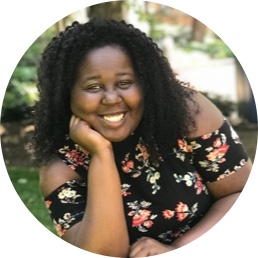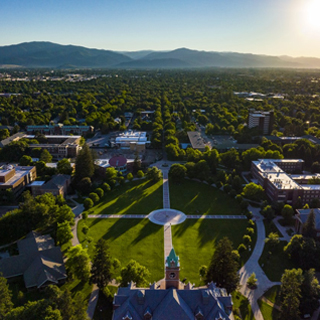Natasha Kalonde

University of Montana senior Natasha Kalonde champions strengthening diversity on campus, stressing that “we need diversity in action.” Kalonde is majoring in history and political science, and compliments her studies with efforts to improve the campus environment for other students. She is the current president of the Black Student Union (BSU), a student senator for the Associated Students of the University of Montana, and a student leader on the university’s Diversity Advisory Council. She plans to continue her positive impact by becoming an immigration lawyer.
Originally from Los Angeles, Kalonde moved to Bozeman before her junior year of high school where she completed high school. The lack of diversity she encountered in Bozeman, Kalonde says, caused culture shock, and inspired her to develop systems that support students of color, something she has been actively doing in Missoula and at UM.
When asked about who has inspired her, Kalonde first notes her older sisters who influenced her to continue the legacy of being a strong woman of color. As a new student at UM, Kalonde met Meshayla Cox, UM alumna and former BSU president, who became Kalonde’s mentor. Kalonde considers Cox to be an older sister. Outside of her mother and sisters, Kalonde “never really had that kind of role model,” making peer mentorship an important part of her UM experience. Cox and others associated with the BSU taught Kalonde to speak out to help create more inclusive practices. They showed Kalonde how to solve problems in real time and to consider people's actions rather than what they say. Kalonde has followed their lead.
As a freshman at UM, Kalonde didn’t immediately know the BSU existed until one of her coworkers in the Food Zoo encouraged her to attend a meeting. Kalonde says that it can be difficult for students of color to find their place at UM. Black students on campus, Kalonde says, isolate themselves when they arrive, thinking “no one looks like me.” She therefore makes it a priority to ensure future students experience a welcoming and inclusive culture.
Kalonde is proud of the work student groups do to provide a community in which all student voices are heard and supported. The Aloha Center on campus, for example, brings diverse groups of students together to broaden community and build connections. Student groups on campus also support one another, working collectively to resolve issues when they arise. They reach out to supportive faculty and staff, and they lend advice to new student groups. In this way, student groups provide a model for the rest of campus regarding how to build inclusive environments.
At UM, Kalonde emphasizes the importance of diversity in people, which for her includes dramatically increasing recruitment of diverse student populations and immediately connecting new students of color with student groups and their departments. In addition, Kalonde stresses the importance of increasing the number of permanent faculty of color across all disciplines. When a student of color forms a relationship with faculty member of color, the student needs confidence that faculty member will remain a consistent part of the UM family.
Kalonde celebrates the good work of the Teresa Branch Diversity Center on campus, which provides an open, free-from-judgement community where students can learn about events, utilize resources, and enjoy time with fellow students. Kalonde appreciates the fact that Provost Jon Harbor and his office take the time to have coffee in the Branch Center once per month. According to Kalonde, “it makes a huge impact when the administration come to a place where students of color actually hang out. This is so important.” She encourages others to follow Harbor’s example.
When asked what kind of advice she has for other students on campus, Kalonde recommends “pursuing action even if the consequences are bigger than that action.” She recommends visiting places on campus that are welcoming if you’re feeling alone. “Go to the Payne Family Native American Center or the Branch Center, which is always open.” She wisely shares, “don’t stay in your own bubble - change campus to better fit you. Be someone who advocates for themselves and other people.”
